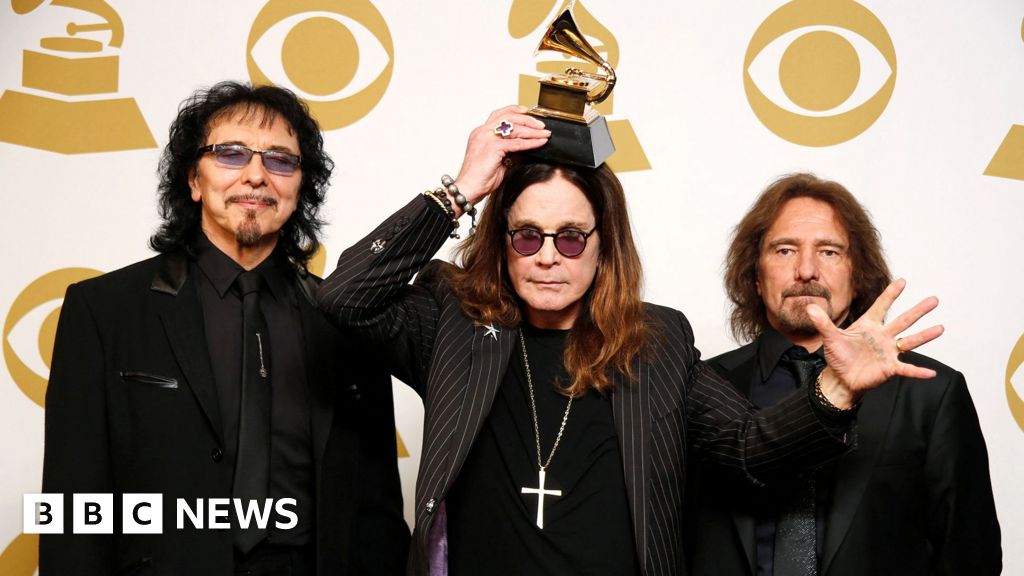'There will never be another Ozzy': Stars pay tribute to rock legend

```html Ozzy Osbourne, 'Prince of Darkness' and Heavy Metal Pioneer, Dies at 76 Ozzy Osbourne, the iconic frontman of Black Sabbath and a pivotal figure in the development of heavy metal, has died at the age of 76. The news, announced by his family on Tuesday, has prompted an outpouring of tributes from fellow musicians, fans, and figures across the entertainment industry. Osbourne's death comes just weeks after Black Sabbath's farewell performance in their hometown of Birmingham, marking the end of an era for one of rock's most influential bands.
Tributes Pour In for Rock Icon Osbourne's impact on music is undeniable. Black Sabbath co-founder Tony Iommi said the band had "lost our brother," while bassist Geezer Butler remembered their final gig with fondness. Drummer Bill Ward shared a poignant old photo of the band, highlighting the deep bond they shared.
Metallica, a band heavily influenced by Black Sabbath, released a statement calling Osbourne a "hero, icon, pioneer, inspiration, mentor, and, most of all, friend." Henry Rollins, former frontman of Black Flag, emphasized Osbourne's unparalleled status in heavy metal: "If you want to talk about heavy metal, first up it's Ozzy Osbourne and Black Sabbath. Everyone else comes after."
Aerosmith referred to Osbourne as "our brother in rock," while AC/DC acknowledged his death as a "great loss to all that loved him." Sir Elton John, in an Instagram post, called Osbourne "a dear friend and a huge trailblazer who secured his place in the pantheon of rock gods - a true legend."
A Legacy Forged in Darkness and Innovation Black Sabbath, formed in Birmingham in 1968, are widely considered the pioneers of heavy metal. Their dark, blues-infused sound, coupled with Osbourne's distinctive vocals and stage presence, created a groundbreaking new genre that continues to influence musicians today. Songs like "Paranoid," "Iron Man," and "War Pigs" became anthems for a generation, solidifying Black Sabbath's place in rock history.
Dr. Deena Weinstein, a sociologist and author of "Heavy Metal: The Music and Its Culture," noted that Osbourne's appeal extended beyond the music itself. "Ozzy Osbourne represented a rebellious spirit and a rejection of mainstream values," she explained. "His persona resonated with young people who felt alienated and disenfranchised. He gave them a voice and a sense of belonging."
Solo Success and Reality TV Stardom After departing Black Sabbath in 1979, Osbourne embarked on a successful solo career, releasing numerous albums and achieving multi-platinum status. His debut solo album, "Blizzard of Ozz," featuring the hit single "Crazy Train," established him as a force to be reckoned with in the music industry.
In the 2000s, Osbourne's image underwent a transformation with the advent of MTV's reality show, "The Osbournes." The show offered a glimpse into the chaotic and often humorous lives of the Osbourne family, revealing a more vulnerable and relatable side to the "Prince of Darkness." While some critics questioned the show's authenticity, it undeniably broadened Osbourne's appeal and introduced him to a new generation of fans.
Final Farewell and Lasting Impact Black Sabbath's final performance in Birmingham on July 5th was a momentous occasion, bringing together musicians from around the world to celebrate the band's legacy. Billy Corgan of The Smashing Pumpkins described it as "one of the greatest musical moments of my life."
Sammy Hagar, former vocalist of Van Halen, who also performed at the farewell concert, remarked on Osbourne's dedication: "For him to have been that close to death on July 5 and still get up there and perform like he promised... Wow! That puts him in a category of his own."
Professor Robert Walser, a musicologist specializing in heavy metal, emphasized the importance of Black Sabbath's Birmingham roots. "The industrial landscape and economic hardship of Birmingham in the 1960s played a crucial role in shaping Black Sabbath's sound and worldview," he stated. "Their music reflected the anxieties and frustrations of working-class youth, giving voice to their experiences in a way that resonated deeply."
Osbourne is survived by his wife Sharon and six children. His music and legacy will continue to inspire and influence generations of musicians and fans for years to come. He was more than just a rock star; he was a cultural icon who defied expectations and left an indelible mark on the world.
Ozzy Osbourne, heavy metal icon, dies at 76. Tributes pour in from musicians and fans worldwide. Black Sabbath's legacy as pioneers of heavy metal is cemented. Osbourne's solo career and reality TV stardom broadened his appeal. Final farewell concert in Birmingham marked the end of an era.
```
Originally sourced from: BBC Entertainment
